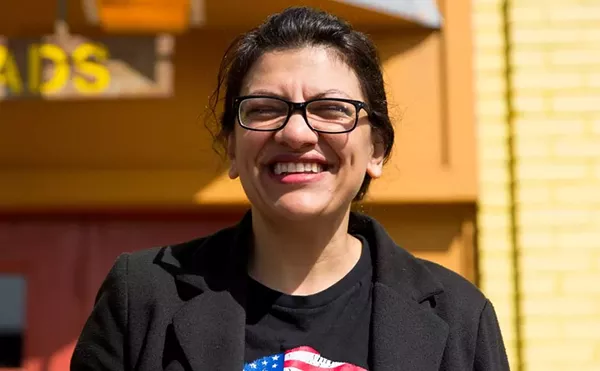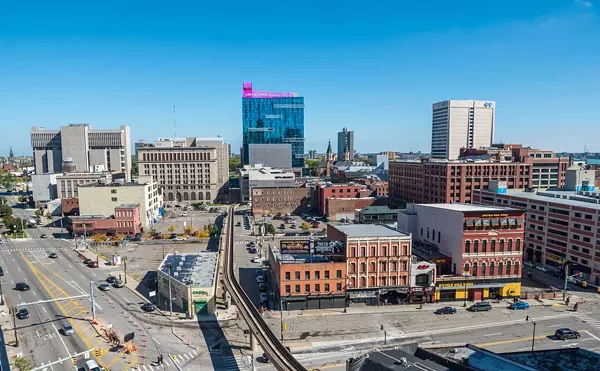Can you believe it's been almost a full year since Hurricane Katrina blew New Orleans — and our few remaining shreds of national arrogance — to smithereens? Happy freaking anniversary. As a funereal parade of liberal commentators have ruefully noted since the cataclysm, if the present administration can't protect us from a natural disaster that was accurately predicted far in advance and minimize its destruction, what possible chance do we have against Al-Qaeda?
Like millions of Americans, Spike Lee watched in anguish and anger as a great American city — more than 70 percent of the population people of color — was allowed to drown in its own sewage and rot away from neglect. Like countless others, he knew their misery would eventually be blown off the front pages by breaking news about the war on terror.
But unlike millions of others, Lee had the wherewithal to do something about it.
The result of the director's typically painstaking filmmaking is When the Levees Broke: A Requiem in Four Acts, an absorbing four-hour documentary premiering in two-hour blocks at 9 p.m. Monday, Aug. 21, and Tuesday, Aug. 22, on HBO. A requiem is a service for the dead, and Lee's reconstruction of the facts laced with a haunting and impressive cross-section of eyewitness accounts leaves no doubt that in his view, an important piece of this nation's soul was lost and gone forever when Lake Pontchartrain's floodwaters breached the 17th Street and London Avenue canals last Aug. 31. The work plays in many moments like a long, loving eulogy.
And who better than Spike to compose this video sermon? Who would you rather have behind the lens? Though he's proven himself a little quirky over the years, when it comes to transforming modern history into filmic art — from Malcolm X to his previous HBO documentaries, including the Oscar-nominated 4 Little Girls in 1998 — Lee upholds a near-fanatical obsession to get it right. No director has done more in our lifetimes to illustrate the black experience (and believe me, this was a black experience), and since history is usually chronicled by the victors, Spike's a good man to have on the other side.
To his credit, however, he doesn't inject himself into this narrative. Instead, it appears Lee capitalized on his celebrity to attract a grand array of nearly 100 observers in front of his camera. You'd think that New Orleans Mayor Ray Nagin and Louisiana Gov. Kathleen Blanco would never want to mutter the word "Katrina" again, but Lee coaxes deep feelings from them. There's a celebrity component as well, as Harry Belafonte, Rev. Al Sharpton, Kanye West, CNN's Soledad O'Brien (whose memorable "how can you know so little?" live interview with ex-FEMA Director Mike Brown is replayed nearly in its entirety) and New Orleans musical ambassador Wynton Marsalis offer their observations. Look fast and you can even catch a glimpse of Sean Penn doing some heavy lifting in the opening hour.
Yet, as it should be, it's the common folks of the Crescent City — the diehards who, as one native puts it, "were raised with Mississippi River tap water in their baby bottles" — who propel the emotional power of this ultimate exercise in true reality TV. Louis Armstrong may sing "Do you know what it means to miss New Orleans?" but these people are living the answer. In many instances, they have lost practically everything. Memorable among them is Phyllis Montana LeBlanc, a feisty wife and mother who, upon being told of First Mama Barbara Bush's assertion that those displaced from their homes and relocated to the Houston Astrodome actually may be better off, spews her phone number to the camera and challenges, "Let her call me and say that." Then there's Herbert Freeman Jr., who, in a long and painfully detailed monologue, recounts how his elderly mother died in her wheelchair beside him while they waited for a rescue bus that never came.
Each of the four hours deals with a different aspect of the tragedy, from preparation through reconstruction, and Lee assumes a journalist's zeal in covering as many angles of the story as he can, from the link between looting and New Orleans' substandard school system to the demeaning insistence of the media to refer to flood victims as refugees. ("What kind of shit is that?" one man rages. "When the storm came in, did it blow away our citizenship too?") If there is one human villain to the saga, however, you can guess who it is: When Lee comes to the infamous moment when President Bush turns to his FEMA director and declares, "Brownie, you're doin' a heckuva job," he plays the quote not once, but three times.
You've heard The Descent is the most frightening horror film being released this summer? Don't you believe it. How can the complete failure of our government, the devastation of a major U.S. city and the collapse of the American ideal not be infinitely more horrifying? HBO will replay When the Levees Broke in a continuous four-hour encore beginning at 9 p.m. Tuesday, Aug. 29. Watch it once if you dare, twice if you care.
Jim McFarlin writes about the boob tube for Metro Times. Send comments to [email protected]






